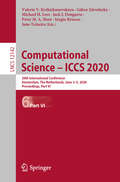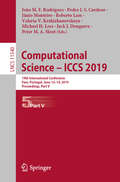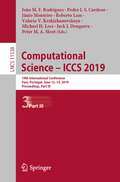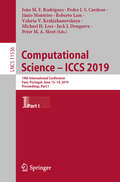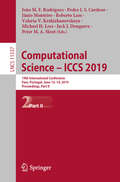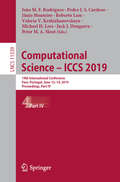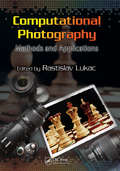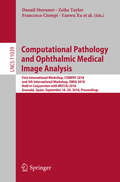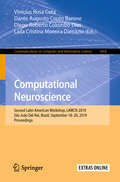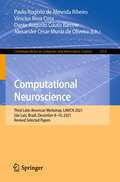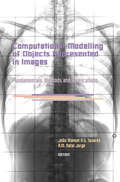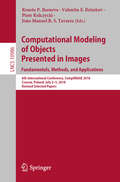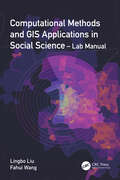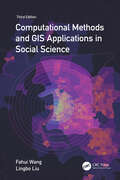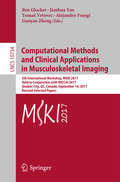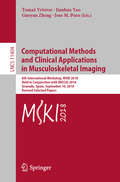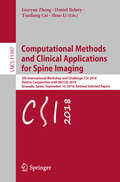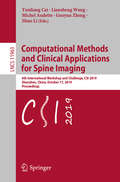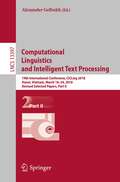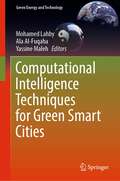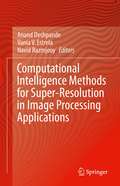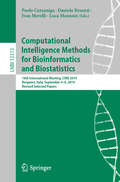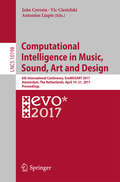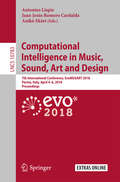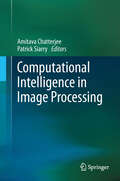- Table View
- List View
Computational Science – ICCS 2020: 20th International Conference, Amsterdam, The Netherlands, June 3–5, 2020, Proceedings, Part VI (Lecture Notes in Computer Science #12142)
by Valeria V. Krzhizhanovskaya Gábor Závodszky Michael H. Lees Jack J. Dongarra Peter M. A. Sloot Sérgio Brissos João TeixeiraThe seven-volume set LNCS 12137, 12138, 12139, 12140, 12141, 12142, and 12143 constitutes the proceedings of the 20th International Conference on Computational Science, ICCS 2020, held in Amsterdam, The Netherlands, in June 2020.* The total of 101 papers and 248 workshop papers presented in this book set were carefully reviewed and selected from 719 submissions (230 submissions to the main track and 489 submissions to the workshops). The papers were organized in topical sections named:Part I: ICCS Main Track Part II: ICCS Main Track Part III: Advances in High-Performance Computational Earth Sciences: Applications and Frameworks; Agent-Based Simulations, Adaptive Algorithms and Solvers; Applications of Computational Methods in Artificial Intelligence and Machine Learning; Biomedical and Bioinformatics Challenges for Computer SciencePart IV: Classifier Learning from Difficult Data; Complex Social Systems through the Lens of Computational Science; Computational Health; Computational Methods for Emerging Problems in (Dis-)Information AnalysisPart V: Computational Optimization, Modelling and Simulation; Computational Science in IoT and Smart Systems; Computer Graphics, Image Processing and Artificial IntelligencePart VI: Data Driven Computational Sciences; Machine Learning and Data Assimilation for Dynamical Systems; Meshfree Methods in Computational Sciences; Multiscale Modelling and Simulation; Quantum Computing Workshop Part VII: Simulations of Flow and Transport: Modeling, Algorithms and Computation; Smart Systems: Bringing Together Computer Vision, Sensor Networks and Machine Learning; Software Engineering for Computational Science; Solving Problems with Uncertainties; Teaching Computational Science; UNcErtainty QUantIficatiOn for ComputationAl modeLs*The conference was canceled due to the COVID-19 pandemic.
Computational Science – ICCS 2019: 19th International Conference, Faro, Portugal, June 12–14, 2019, Proceedings, Part V (Lecture Notes in Computer Science #11540)
by João M. F. Rodrigues Pedro J. S. Cardoso Jânio Monteiro Roberto Lam Valeria V. Krzhizhanovskaya Michael H. Lees Jack J. Dongarra Peter M. A. SlootThe five-volume set LNCS 11536, 11537, 11538, 11539, and 11540 constitutes the proceedings of the 19th International Conference on Computational Science, ICCS 2019, held in Faro, Portugal, in June 2019. The total of 65 full papers and 168 workshop papers presented in this book set were carefully reviewed and selected from 573 submissions (228 submissions to the main track and 345 submissions to the workshops). The papers were organized in topical sections named: Part I: ICCS Main Track Part II: ICCS Main Track; Track of Advances in High-Performance Computational Earth Sciences: Applications and Frameworks; Track of Agent-Based Simulations, Adaptive Algorithms and Solvers; Track of Applications of Matrix Methods in Artificial Intelligence and Machine Learning; Track of Architecture, Languages, Compilation and Hardware Support for Emerging and Heterogeneous Systems Part III: Track of Biomedical and Bioinformatics Challenges for Computer Science; Track of Classifier Learning from Difficult Data; Track of Computational Finance and Business Intelligence; Track of Computational Optimization, Modelling and Simulation; Track of Computational Science in IoT and Smart Systems Part IV: Track of Data-Driven Computational Sciences; Track of Machine Learning and Data Assimilation for Dynamical Systems; Track of Marine Computing in the Interconnected World for the Benefit of the Society; Track of Multiscale Modelling and Simulation; Track of Simulations of Flow and Transport: Modeling, Algorithms and Computation Part V: Track of Smart Systems: Computer Vision, Sensor Networks and Machine Learning; Track of Solving Problems with Uncertainties; Track of Teaching Computational Science; Poster Track ICCS 2019 Chapter “Comparing Domain-decomposition Methods for the Parallelization of Distributed Land Surface Models” is available open access under a Creative Commons Attribution 4.0 International License via link.springer.com.
Computational Science – ICCS 2019: 19th International Conference, Faro, Portugal, June 12–14, 2019, Proceedings, Part III (Lecture Notes in Computer Science #11538)
by Jânio Monteiro João M. Rodrigues Valeria V. Krzhizhanovskaya Roberto Lam Michael H. Lees Jack J. Dongarra Pedro J. Cardoso Peter M.A. SlootThe five-volume set LNCS 11536, 11537, 11538, 11539 and 11540 constitutes the proceedings of the 19th International Conference on Computational Science, ICCS 2019, held in Faro, Portugal, in June 2019.The total of 65 full papers and 168 workshop papers presented in this book set were carefully reviewed and selected from 573 submissions (228 submissions to the main track and 345 submissions to the workshops). The papers were organized in topical sections named: Part I: ICCS Main Track Part II: ICCS Main Track; Track of Advances in High-Performance Computational Earth Sciences: Applications and Frameworks; Track of Agent-Based Simulations, Adaptive Algorithms and Solvers; Track of Applications of Matrix Methods in Artificial Intelligence and Machine Learning; Track of Architecture, Languages, Compilation and Hardware Support for Emerging and Heterogeneous Systems Part III: Track of Biomedical and Bioinformatics Challenges for Computer Science; Track of Classifier Learning from Difficult Data; Track of Computational Finance and Business Intelligence; Track of Computational Optimization, Modelling and Simulation; Track of Computational Science in IoT and Smart Systems Part IV: Track of Data-Driven Computational Sciences; Track of Machine Learning and Data Assimilation for Dynamical Systems; Track of Marine Computing in the Interconnected World for the Benefit of the Society; Track of Multiscale Modelling and Simulation; Track of Simulations of Flow and Transport: Modeling, Algorithms and Computation Part V: Track of Smart Systems: Computer Vision, Sensor Networks and Machine Learning; Track of Solving Problems with Uncertainties; Track of Teaching Computational Science; Poster Track ICCS 2019Chapter “Comparing Domain-decomposition Methods for the Parallelization of Distributed Land Surface Models” is available open access under a Creative Commons Attribution 4.0 International License via link.springer.com.
Computational Science – ICCS 2019: 19th International Conference, Faro, Portugal, June 12–14, 2019, Proceedings, Part I (Lecture Notes in Computer Science #11536)
by João M. Rodrigues Pedro J. Cardoso Peter M.A. Sloot Jânio Monteiro Roberto Lam Valeria V. Krzhizhanovskaya Michael H. Lees Jack J. DongarraThe five-volume set LNCS 11536, 11537, 11538, 11539, and 11540 constitutes the proceedings of the 19th International Conference on Computational Science, ICCS 2019, held in Faro, Portugal, in June 2019.The total of 65 full papers and 168 workshop papers presented in this book set were carefully reviewed and selected from 573 submissions (228 submissions to the main track and 345 submissions to the workshops). The papers were organized in topical sections named: Part I: ICCS Main Track Part II: ICCS Main Track; Track of Advances in High-Performance Computational Earth Sciences: Applications and Frameworks; Track of Agent-Based Simulations, Adaptive Algorithms and Solvers; Track of Applications of Matrix Methods in Artificial Intelligence and Machine Learning; Track of Architecture, Languages, Compilation and Hardware Support for Emerging and Heterogeneous Systems Part III: Track of Biomedical and Bioinformatics Challenges for Computer Science; Track of Classifier Learning from Difficult Data; Track of Computational Finance and Business Intelligence; Track of Computational Optimization, Modelling and Simulation; Track of Computational Science in IoT and Smart Systems Part IV: Track of Data-Driven Computational Sciences; Track of Machine Learning and Data Assimilation for Dynamical Systems; Track of Marine Computing in the Interconnected World for the Benefit of the Society; Track of Multiscale Modelling and Simulation; Track of Simulations of Flow and Transport: Modeling, Algorithms and Computation Part V: Track of Smart Systems: Computer Vision, Sensor Networks and Machine Learning; Track of Solving Problems with Uncertainties; Track of Teaching Computational Science; Poster Track ICCS 2019 Chapter “Comparing Domain-decomposition Methods for the Parallelization of Distributed Land Surface Models” is available open access under a Creative Commons Attribution 4.0 International License via link.springer.com.
Computational Science – ICCS 2019: 19th International Conference, Faro, Portugal, June 12–14, 2019, Proceedings, Part II (Lecture Notes in Computer Science #11537)
by João M. Rodrigues Pedro J. Cardoso Peter M.A. Sloot Jânio Monteiro Roberto Lam Valeria V. Krzhizhanovskaya Michael H. Lees Jack J. DongarraThe five-volume set LNCS 11536, 11537, 11538, 11539 and 11540 constitutes the proceedings of the 19th International Conference on Computational Science, ICCS 2019, held in Faro, Portugal, in June 2019.The total of 65 full papers and 168 workshop papers presented in this book set were carefully reviewed and selected from 573 submissions (228 submissions to the main track and 345 submissions to the workshops). The papers were organized in topical sections named:Part I: ICCS Main Track Part II: ICCS Main Track; Track of Advances in High-Performance Computational Earth Sciences: Applications and Frameworks; Track of Agent-Based Simulations, Adaptive Algorithms and Solvers; Track of Applications of Matrix Methods in Artificial Intelligence and Machine Learning; Track of Architecture, Languages, Compilation and Hardware Support for Emerging and Heterogeneous Systems Part III: Track of Biomedical and Bioinformatics Challenges for Computer Science; Track of Classifier Learning from Difficult Data; Track of Computational Finance and Business Intelligence; Track of Computational Optimization, Modelling and Simulation; Track of Computational Science in IoT and Smart Systems Part IV: Track of Data-Driven Computational Sciences; Track of Machine Learning and Data Assimilation for Dynamical Systems; Track of Marine Computing in the Interconnected World for the Benefit of the Society; Track of Multiscale Modelling and Simulation; Track of Simulations of Flow and Transport: Modeling, Algorithms and Computation Part V: Track of Smart Systems: Computer Vision, Sensor Networks and Machine Learning; Track of Solving Problems with Uncertainties; Track of Teaching Computational Science; Poster Track ICCS 2019 Chapter “Comparing Domain-decomposition Methods for the Parallelization of Distributed Land Surface Models” is available open access under a Creative Commons Attribution 4.0 International License via link.springer.com.
Computational Science – ICCS 2019: 19th International Conference, Faro, Portugal, June 12–14, 2019, Proceedings, Part IV (Lecture Notes in Computer Science #11539)
by João M. Rodrigues Pedro J. Cardoso Peter M.A. Sloot Jânio Monteiro Roberto Lam Valeria V. Krzhizhanovskaya Michael H. Lees Jack J. DongarraThe five-volume set LNCS 11536, 11537, 11538, 11539 and 11540 constitutes the proceedings of the 19th International Conference on Computational Science, ICCS 2019, held in Faro, Portugal, in June 2019.The total of 65 full papers and 168 workshop papers presented in this book set were carefully reviewed and selected from 573 submissions (228 submissions to the main track and 345 submissions to the workshops). The papers were organized in topical sections named: Part I: ICCS Main Track Part II: ICCS Main Track; Track of Advances in High-Performance Computational Earth Sciences: Applications and Frameworks; Track of Agent-Based Simulations, Adaptive Algorithms and Solvers; Track of Applications of Matrix Methods in Artificial Intelligence and Machine Learning; Track of Architecture, Languages, Compilation and Hardware Support for Emerging and Heterogeneous Systems Part III: Track of Biomedical and Bioinformatics Challenges for Computer Science; Track of Classifier Learning from Difficult Data; Track of Computational Finance and Business Intelligence; Track of Computational Optimization, Modelling and Simulation; Track of Computational Science in IoT and Smart Systems Part IV: Track of Data-Driven Computational Sciences; Track of Machine Learning and Data Assimilation for Dynamical Systems; Track of Marine Computing in the Interconnected World for the Benefit of the Society; Track of Multiscale Modelling and Simulation; Track of Simulations of Flow and Transport: Modeling, Algorithms and Computation Part V: Track of Smart Systems: Computer Vision, Sensor Networks and Machine Learning; Track of Solving Problems with Uncertainties; Track of Teaching Computational Science; Poster Track ICCS 2019Chapter “Comparing Domain-decomposition Methods for the Parallelization of Distributed Land Surface Models” is available open access under a Creative Commons Attribution 4.0 International License via link.springer.com.
Computational Photography: Methods and Applications (Digital Imaging and Computer Vision)
by Rastislav LukacComputational photography refers broadly to imaging techniques that enhance or extend the capabilities of digital photography. This new and rapidly developing research field has evolved from computer vision, image processing, computer graphics and applied optics—and numerous commercial products capitalizing on its principles have already appeared in diverse market applications, due to the gradual migration of computational algorithms from computers to imaging devices and software. Computational Photography: Methods and Applications provides a strong, fundamental understanding of theory and methods, and a foundation upon which to build solutions for many of today's most interesting and challenging computational imaging problems. Elucidating cutting-edge advances and applications in digital imaging, camera image processing, and computational photography, with a focus on related research challenges, this book: Describes single capture image fusion technology for consumer digital cameras Discusses the steps in a camera image processing pipeline, such as visual data compression, color correction and enhancement, denoising, demosaicking, super-resolution reconstruction, deblurring, and high dynamic range imaging Covers shadow detection for surveillance applications, camera-driven document rectification, bilateral filtering and its applications, and painterly rendering of digital images Presents machine-learning methods for automatic image colorization and digital face beautification Explores light field acquisition and processing, space-time light field rendering, and dynamic view synthesis with an array of cameras Because of the urgent challenges associated with emerging digital camera applications, image processing methods for computational photography are of paramount importance to research and development in the imaging community. Presenting the work of leading experts, and edited by a renowned authority in digital color imaging and camera image processing, this book considers the rapid developments in this area and addresses very particular research and application problems. It is ideal as a stand-alone professional reference for design and implementation of digital image and video processing tasks, and it can also be used to support graduate courses in computer vision, digital imaging, visual data processing, and computer graphics, among others.
Computational Pathology and Ophthalmic Medical Image Analysis: First International Workshop, COMPAY 2018, and 5th International Workshop, OMIA 2018, Held in Conjunction with MICCAI 2018, Granada, Spain, September 16 - 20, 2018, Proceedings (Lecture Notes in Computer Science #11039)
by Danail Stoyanov Zeike Taylor Francesco Ciompi Yanwu Xu Anne Martel Lena Maier-Hein Nasir Rajpoot Jeroen van der Laak Mitko Veta Stephen McKenna David Snead Emanuele Trucco Mona K. Garvin Xin Jan Chen Hrvoje BogunovicThis book constitutes the refereed joint proceedings of the First International Workshop on Computational Pathology, COMPAY 2018, and the 5th International Workshop on Ophthalmic Medical Image Analysis, OMIA 2018, held in conjunction with the 21st International Conference on Medical Imaging and Computer-Assisted Intervention, MICCAI 2018, in Granada, Spain, in September 2018. The 19 full papers (out of 25 submissions) presented at COMPAY 2018 and the 21 full papers (out of 31 submissions) presented at OMIA 2018 were carefully reviewed and selected. The COMPAY papers focus on artificial intelligence and deep learning. The OMIA papers cover various topics in the field of ophthalmic image analysis.
Computational Neuroscience: Second Latin American Workshop, LAWCN 2019, São João Del-Rei, Brazil, September 18–20, 2019, Proceedings (Communications in Computer and Information Science #1068)
by Vinícius Rosa Cota Dante Augusto Couto Barone Diego Roberto Colombo Dias Laila Cristina Moreira DamázioThis book constitutes the thoroughly refereed proceedings of the Second International Workshop of Computational Neuroscience, held in São João Del-Rei, Brazil, in September 2019. The 17 full papers and 3 short papers presented have been thoroughly reviewed and selected from 45 submissions. The papers are organized in topical sections: artificial intelligence, machine learning, and related topics; complex systems and complex networks; computational neuroscience of learning and memory; neural signal processing; software and hardware implementations in neuroscience; brain-machine interfaces and neurostimulation; and seizure prediction.
Computational Neuroscience: Third Latin American Workshop, LAWCN 2021, São Luís, Brazil, December 8–10, 2021, Revised Selected Papers (Communications in Computer and Information Science #1519)
by Paulo Rogério de Almeida Ribeiro Vinícius Rosa Cota Dante Augusto Couto Barone Alexandre César Muniz de OliveiraThis book constitutes the refereed proceedings of the Third Latin American Workshop, LAWCN 2021, held in Sao Luis do Maranhao, Brazil, during December 8–10, 2021.The 13 full papers and 3 short papers included in this book were carefully reviewed and selected from 27 submissions. They were organized in topical sections as follows: Interdisciplinary applications of Artificial Intelligence (AI) and Machine Learning (ML); AI and ML applied to robotics; AI and ML applied to biomedical sciences; Health issues and computational neuroscience; Software and hardware implementations in neuroscience; and Neuroengineering – science and technology.
Computational Modelling of Objects Represented in Images. Fundamentals, Methods and Applications: Proceedings of the International Symposium CompIMAGE 2006 (Coimbra, Portugal, 20-21 October 2006) (Lecture Notes In Computer Science / Image Processing, Computer Vision, Pattern Recognition, And Graphics Ser.)
by João Manuel R.S. Tavares R.M. Natal JorgeThis book contains keynote lectures and full papers presented at the International Symposium on Computational Modelling of Objects Represented in Images (CompIMAGE), held in Coimbra, Portugal, on 20-21 October 2006. International contributions from nineteen countries provide a comprehensive coverage of the current state-of-the-art in the fields of: - Image Processing and Analysis; - Image Segmentation; - Data Interpolation; - Registration, Acquisition and Compression; - 3D Reconstruction; - Objects Tracking; - Motion and Deformation Analysis; - Objects Simulation; - Medical Imaging; - Computational Bioimaging and Visualization. Related techniques also covered in this book include the finite element method, modal analyses, stochastic methods, principal and independent components analyses and distribution models. Computational Modelling of Objects Represented in Images will be useful to academics, researchers and professionals in Computational Vision (image processing and analysis), Computer Sciences, and Computational Mechanics.
Computational Modeling of Objects Presented in Images. Fundamentals, Methods, and Applications: 6th International Conference, CompIMAGE 2018, Cracow, Poland, July 2–5, 2018, Revised Selected Papers (Lecture Notes in Computer Science #10986)
by Reneta P. Barneva Valentin E. Brimkov Piotr Kulczycki João Manuel TavaresThis book constitutes the refereed post-conference proceedings of the 6th International Symposium on Computational Modeling of Objects Presented in Images, CompIMAGE 2018, held in Cracow, Poland, inJuly 2018.The 16 revised full papers presented in this book were carefully reviewed and selected from 30 submissions. The papers cover the following topics: digital geometry; digital tomography; and methods and applications.
Computational Methods and GIS Applications in Social Science - Lab Manual
by Lingbo Liu Fahui WangThis lab manual is a companion to the third edition of the textbook Computational Methods and GIS Applications in Social Science. It uses the open-source platform KNIME to illustrate a step-by-step implementation of each case study in the book. KNIME is a workflow-based platform supporting visual programming and multiple scripting language such as R, Python, and Java. The intuitive, structural workflow not only helps students better understand the methodology of each case study in the book, but also enables them to easily replicate, transplant and expand the workflow for further exploration with new data or models. This lab manual could also be used as a GIS automation reference for advanced users in spatial analysis. FEATURES The first hands-on, open-source KNIME lab manual written in tutorial style and focused on GIS applications in social science Includes 22 case studies from the United States and China that parallel the methods developed in the textbook Provides clear step-by-step explanations on how to use the open-source platform KNIME to understand basic and advanced analytical methods through real-life case studies Enables readers to easily replicate and expand their work with new data and models A valuable guide for students and practitioners worldwide engaged in efforts to develop GIS automation in spatial analysis This lab manual is intended for upper-level undergraduate and graduate students taking courses in quantitative geography, spatial analysis, GIS applications in socioeconomic studies, GIS applications in business, and location theory, as well as researchers in the similar fields of geography, city and regional planning, sociology, and public administration.
Computational Methods and GIS Applications in Social Science
by Fahui Wang Lingbo LiuThis textbook integrates GIS, spatial analysis, and computational methods for solving real-world problems in various policy-relevant social science applications. Thoroughly updated, the third edition showcases the best practices of computational spatial social science and includes numerous case studies with step-by-step instructions in ArcGIS Pro and open-source platform KNIME. Readers sharpen their GIS skills by applying GIS techniques in detecting crime hotspots, measuring accessibility of primary care physicians, forecasting the impact of hospital closures on local community, or siting the best locations for business. FEATURES Fully updated using the latest version of ArcGIS Pro and open-source platform KNIME Features two brand-new chapters on agent-based modeling and big data analytics Provides newly automated tools for regionalization, functional region delineation, accessibility measures, planning for maximum equality in accessibility, and agent-based crime simulation Includes many compelling examples and real-world case studies related to social science, urban planning, and public policy Provides a website for downloading data and programs for implementing all case studies included in the book and the KNIME lab manual Intended for students taking upper-level undergraduate and graduate-level courses in quantitative geography, spatial analysis, and GIS applications, as well as researchers and professionals in fields such as geography, city and regional planning, crime analysis, public health, and public administration.
Computational Methods and Clinical Applications in Musculoskeletal Imaging: 5th International Workshop, MSKI 2017, Held in Conjunction with MICCAI 2017, Quebec City, QC, Canada, September 10, 2017, Revised Selected Papers (Lecture Notes in Computer Science #10734)
by Tomaž Vrtovec Jianhua Yao Ben Glocker Alejandro Frangi Guoyan ZhengThis book constitutes the refereed proceedings of the 5th International Workshop and Challenge on Computational Methods and Clinical Applications for Musculoskeletal Imaging, MSKI 2017, held in conjunction with MICCAI 2017, in Quebec City, QC, Canada, in September 2017. The 13 workshop papers were carefully reviewed and selected for inclusion in this volume. Topics of interest include all major aspects of musculoskeletal imaging, for example: clinical applications of musculoskeletal computational imaging; computer-aided detection and diagnosis of conditions of the bones, muscles and joints; image-guided musculoskeletal surgery and interventions; image-based assessment and monitoring of surgical and pharmacological treatment; segmentation, registration, detection, localization and visualization of the musculoskeletal anatomy; statistical and geometrical modeling of the musculoskeletal shape and appearance; image-based microstructural characterization of musculoskeletal tissue; novel techniques for musculoskeletal imaging.
Computational Methods and Clinical Applications in Musculoskeletal Imaging: 6th International Workshop, MSKI 2018, Held in Conjunction with MICCAI 2018, Granada, Spain, September 16, 2018, Revised Selected Papers (Lecture Notes in Computer Science #11404)
by Tomaž Vrtovec Jianhua Yao Guoyan Zheng Jose M. PozoThis book constitutes the refereed proceedings of the 6th International Workshop on Computational Methods and Clinical Applications for Musculoskeletal Imaging, MSKI 2018, held in conjunction with MICCAI 2018, in Granada, Spain, in September 2018. The 13 workshop papers were carefully reviewed and selected for inclusion in this volume. Topics of interest include all major aspects of musculoskeletal imaging, for example: clinical applications of musculoskeletal computational imaging; computer-aided detection and diagnosis of conditions of the bones, muscles and joints; image-guided musculoskeletal surgery and interventions; image-based assessment and monitoring of surgical and pharmacological treatment; segmentation, registration, detection, localization and visualization of the musculoskeletal anatomy; statistical and geometrical modeling of the musculoskeletal shape and appearance; image-based microstructural characterization of musculoskeletal tissue; novel techniques for musculoskeletal imaging.
Computational Methods and Clinical Applications for Spine Imaging: 5th International Workshop and Challenge, CSI 2018, Held in Conjunction with MICCAI 2018, Granada, Spain, September 16, 2018, Revised Selected Papers (Lecture Notes in Computer Science #11397)
by Guoyan Zheng Daniel Belavy Yunliang Cai Shuo LiThis book constitutes the refereed proceedings of the 5th International Workshop and Challenge on Computational Methods and Clinical Applications for Spine Imaging, CSI 2018, held in conjunction with MICCAI 2018, in Granada, Spain, in September 2018. The 8 full papers presented together with 8 short papers and 1 keynote were carefully reviewed and selected for inclusion in this volume. Papers on novel methodology and clinical research, and also papers which demonstrate the performance of methods on the provided challenges, the aim is to cover both theoretical and very practical aspects of computerized spinal imaging.
Computational Methods and Clinical Applications for Spine Imaging: 6th International Workshop and Challenge, CSI 2019, Shenzhen, China, October 17, 2019, Proceedings (Lecture Notes in Computer Science #11963)
by Guoyan Zheng Shuo Li Yunliang Cai Liansheng Wang Michel AudetteThis book constitutes the proceedings of the 7th International Workshop and Challenge on Computational Methods and Clinical Applications for Spine Imaging, CSI 2019, which was held in conjunction with MICCAI on October 17, 2019, in Shenzhen, China. All submissions were accepted for publication; the book contains 5 peer-reviewed regular papers, covering topics of vertrebra detection, spine segmentation and image-based diagnosis, and 9 challenge papers, investigating (semi-)automatic spinal curvature estimation algorithms and providing a standard evaluation framework with a set of x-ray images.
Computational Linguistics and Intelligent Text Processing: 19th International Conference, CICLing 2018, Hanoi, Vietnam, March 18–24, 2018, Revised Selected Papers, Part II (Lecture Notes in Computer Science #13397)
by Alexander GelbukhThe two-volume set LNCS 13396 and 13397 constitutes revised selected papers from the CICLing 2018 conference which took place in Hanoi, Vietnam, in March 2018.The total of 68 papers presented in the two volumes was carefully reviewed and selected from 181 submissions. The focus of the conference was on following topics such as computational linguistics and intelligent text and speech processing and others. The papers are organized in the following topical sections: General, Author profiling and authorship attribution, social network analysis, Information retrieval, information extraction, Lexical resources, Machine translation, Morphology, syntax, Semantics and text similarity, Sentiment analysis, Syntax and parsing, Text categorization and clustering, Text generation, and Text mining.
Computational Intelligence Techniques for Green Smart Cities (Green Energy and Technology)
by Mohamed Lahby Ala Al-Fuqaha Yassine MalehThis book contains high-quality and original research on computational intelligence for green smart cities research. In recent years, the use of smart city technology has rapidly increased through the successful development and deployment of Internet of Things (IoT) architectures. The citizens' quality of life has been improved in several sensitive areas of the city, such as transportation, buildings, health care, education, environment, and security, thanks to these technological advancesComputational intelligence techniques and algorithms enable a computational analysis of enormous data sets to reveal patterns that recur. This information is used to inform and improve decision-making at the municipal level to build smart computational intelligence techniques and sustainable cities for their citizens. Machine intelligence allows us to identify trends (patterns). The smart city could better integrate its transportation network, for example. By offering a better public transportation network adapted to the demand, we could reduce personal vehicles and energy consumption. A smart city could use models to predict the consequences of a change, such as pedestrianizing a street or adding a bike lane. A city can even create a 3D digital twin to test hypothetical projects. This book comprises many state-of-the-art contributions from scientists and practitioners working in machine intelligence and green smart cities. It aspires to provide a relevant reference for students, researchers, engineers, and professionals working in this area or those interested in grasping its diverse facets and exploring the latest advances in machine intelligence for green and sustainable smart city applications.
Computational Intelligence Methods for Super-Resolution in Image Processing Applications
by Anand Deshpande Vania V. Estrela Navid RazmjooyThis book explores the application of deep learning techniques within a particularly difficult computational type of computer vision (CV) problem ─ super-resolution (SR). The authors present and discuss ways to apply computational intelligence (CI) methods to SR. The volume also explores the possibility of using different kinds of CV techniques to develop and enhance the tools/processes related to SR. The application areas covered include biomedical engineering, healthcare applications, medicine, histology, and material science. The book will be a valuable reference for anyone concerned with multiple multimodal images, especially professionals working in remote sensing, nanotechnology and immunology at research institutes, healthcare facilities, biotechnology institutions, agribusiness services, veterinary facilities, and universities.
Computational Intelligence Methods for Bioinformatics and Biostatistics: 16th International Meeting, CIBB 2019, Bergamo, Italy, September 4–6, 2019, Revised Selected Papers (Lecture Notes in Computer Science #12313)
by Paolo Cazzaniga Daniela Besozzi Ivan Merelli Luca ManzoniThis book constitutes revised selected papers from the 16th International Meeting on Computational Intelligence Methods for Bioinformatics and Biostatistics, CIBB 2019, which was held in Bergamo, Italy, during September 4-6, 2019. The 28 full papers presented in this volume were carefully reviewed and selected from 55 submissions. The papers are grouped in topical sections as follows: Computational Intelligence Methods for Bioinformatics and Biostatistics; Algebraic and Computational Methods for the Study of RNA Behaviour; Intelligence methods for molecular characterization medicine; Machine Learning in Healthcare Informatics and Medical Biology; Modeling and Simulation Methods for Computational Biology and Systems Medicine.
Computational Intelligence in Music, Sound, Art and Design: 6th International Conference, EvoMUSART 2017, Amsterdam, The Netherlands, April 19–21, 2017, Proceedings (Lecture Notes in Computer Science #10198)
by João Correia, Vic Ciesielski and Antonios LiapisThis book constitutes the refereed proceedings of the 6th International Conference on Evolutionary Computation in Combinatorial Optimization, EvoMUSART 2017, held in Amsterdam, The Netherlands, in April 2017, co-located with the Evo*2017 events EuroGP, EvoCOP and EvoApplications. The 24 revised full papers presented were carefully reviewed and selected from 29 submissions. The papers cover a wide range of topics and application areas, including: generative approaches to music, graphics, game content, and narrative; music information retrieval; computational aesthetics; the mechanics of interactive evolutionary computation; computer-aided design; and the art theory of evolutionary computation.
Computational Intelligence in Music, Sound, Art and Design
by Antonios Liapis Juan Jesús Romero Cardalda Anikó EkártThis book constitutes the refereed proceedings of the 7th International Conference on Evolutionary Computation in Combinatorial Optimization, EvoMUSART 2018, held in Parma, Italy, in April 2018, co-located with the Evo*2017 events EuroGP, EvoCOP and EvoApplications. The 21 revised full papers presented were carefully reviewed and selected from 33 submissions. The papers cover a wide range of topics and application areas, including: generative approaches to music and visual art; medical art therapy; visualization in virtual reality; jewellery design; interactive evolutionary computation; and the art theory of evolutionary computation.
Computational Intelligence in Image Processing
by Patrick Siarry Amitava ChatterjeeComputational intelligence based techniques have firmly established themselves as viable, alternate, mathematical tools for more than a decade. They have been extensively employed in many systems and application domains, among these signal processing, automatic control, industrial and consumer electronics, robotics, finance, manufacturing systems, electric power systems, and power electronics. Image processing is also an extremely potent area which has attracted the attention of many researchers who are interested in the development of new computational intelligence-based techniques and their suitable applications, in both research problems and in real-world problems. Part I of the book discusses several image preprocessing algorithms; Part II broadly covers image compression algorithms; Part III demonstrates how computational intelligence-based techniques can be effectively utilized for image analysis purposes; and Part IV shows how pattern recognition, classification and clustering-based techniques can be developed for the purpose of image inferencing. The book offers a unified view of the modern computational intelligence techniques required to solve real-world problems and it is suitable as a reference for engineers, researchers and graduate students.
